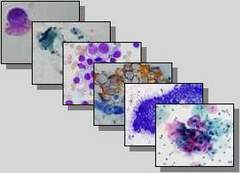
Education of Cytotechnicians in Croatia
|
|
Education of Cytotechnicians in Croatia |
Clinical
cytology in Croatia has developed in a similar way as in the other European countries:
clinicians have tried to microscopically diagnose different
diseases in their patients by a simple, safe and rapid method which could have been
performed in their clinical departments. The
technical part of this diagnostical method was introduced into practice very soon by
laboratory technicians who firstly assisted in collecting the material for cytological
examination and stained smears. Working with
a cytologist, they also learned to microscopically differ normal from pathologically
changed cells, especially in the exfoliative material. As the number of cytologic
laboratories, as well as the number of cytologic analyses
was gradually rising, the need for laboratory technicians was becoming
bigger as well. Their individual education in that work
was no longer possible. It became obvious they should be educated
systematically in a form of school. The first
cytotechnicians´ course was carried out in 1968/1969 in the duration of six months for
laboratory technicians with high-school degree. It consisted of theoretical and practical
parts with the exam at the end. Between 1968 and 1977 there were seven courses similar to
this one, with the 86 trained cytotechnicians
as their result. The greatest part of the teaching comprised gynecological cytology, but
pulmonological, hematological and the others, both exudative and aspiratory cytology were
also included in the programme. In order
to recognize the course as a kind of education with the appropriate qualification and to
include it into the existing schooling system, in 1981 the one-year programme for the
training of cytotechnicians was introduced. Between 1981 and 1992 78 cytotechnicians were
educated in that way. From the following Tables, the programme for the six-month
course can be seen, as well as the one for one-year cytotechnicians schooling, which
was legally regulated as the additional year for high-school graduates (the fifth grade).
After passing the exam, cytotechnicians acquired the certificate with the degree of
cytotechnician - cyto-screener. The
examiners were distinguished cytologists, lecturers in certain teaching areas, and the
applicants had to analyse smears and answer questions from all cytology branches comprised
in the teaching programme. Apart from the cytological, some other courses needed for better understanding of cytology were
included in the programme (as it can be seen in the following teaching programmes). From
the very beginning of systematic education for cytotechnicians, the complete issue was in
charge of the Croatian Society for Clinical Cytology. Besides a regular teaching
programme, the permanent education for cytotechnicians was implemented in the form of professional meetings and lectures. Until
1993/94, the course for cytotechnicians was conducted at the Post-Secondary Medical School
with the enclosed programme. The introduction of a 2-year programme for cytotechnicians in
the same institution is being planned. The
already mentioned course was implemented on the basis of the suggested programme for the
post-secondary education in the form of learning from work (40% of the programme suggested
for the regular post-secondary level
teaching). At the
end of such a course, an adequate exam was held and the certificate obtained.
Cytotechnicians have an option to acquire the degree of medical cytology engineer by passing the differential exams and writing the
graduation theses when the new programme is finally implemented in the Post-Secondary
Medical School (related to changes in the relevant educational system). TEACHING PROGRAMME In the six month course for the training of medical staff
to perform cytodiagnostic tasks (cytotechnicians), for the attendents who graduated from
the High-school for Medical Technicians - laboratory section.
*the programme was carried out for seven times in the period 1968-1976, with 86 cytotechnicians
CURRICULUM OF SPECIALIZED EDUCATION FOR PROFESSIONAL
EMPLOYEES IN SANITARY-LABORATORY PROGRAMME FOR THE 5th GRADE (ADDITIONAL YEAR OF HIGH SCHOOL) FOR THE
CYTODIAGNOSTICAL NEEDS CURRICULUM STRUCTURE Obligatory professional programmes -745 hours Foundations of Profession
(85) Selected Chapters in Anatomy and Physiology: 34 hours Selected Chapters in Biology and Humane Genetics: 34 hours Selected Chapters in Biochemistry: 17 hours Narrow professional field (660) Selected Chapters in Histology and Pathohistology: 51 hour Introduction to Cytodiagnostics and Cytochemistry: 17
hours Epidemiology of Carcinoma, Genitals, and Breast: 17 hours Cytodiagnostics for Cytotechnicians in Gynecology: 150
hours Cytodiagnostics for Cytotechnicians in Pulmonology: 85
hours Cytodiagnostics for Cytotechnicians in Hematology: 50
hours Cytodiagnostics for
Cytotechnicians in Endocrinology: 50 hours Cytodiagnostics for Cytotechnicians in Gastroenterology:
50 hours Cytodiagnostics for Cytotechnicians in Urology: 20 hours Cytodiagnostics of Effusion and Liquor: 30 hours TOTAL: 605 hours Practical work: 140 hours T o t a l: 745 hours
* the programme was realized 5 times in the period 1981-1992 with 78 cytotechnicians
TEACHING PROGRAMME AND THE TOTAL NUMBER OF STANDARDISED
STUDY HOURS OF POSSIBLE PERFORMANCE OF ENGINEER STUDIES IN MEDICAL CYTODIAGNOSTICS DEGREE
PROGRAMME (6th GRADE – POST –SECONDARY SCHOOL EDUCATION)
* 1993-1994 acomplished by 11 technicians
(The programme of Post-Secondary Medical School, Zagreb, Mlinarska 38) |
||||||||||||||||||||||||||||||||||||||||||||||||||||||||||||||||||||||||||||||||||||||||||||||||||||||||||||||||||||||||||||||||||||||||||||||||||||||||||||||||||||||||||||||||||||||||||||||||||||||||||||||||||||||||||||||||||||||||||||||||||||||||||||||||||||||||||||||||||||||||||||||||||||||||||||||||||||||||||||||||||||||||||||||||||||||||||||||||||||||||||||||||||||||||||||||||||||||||||||||||||||||||||||||||||||||||||||||||||||||||||||||||||||||||||||||||||||||||||||||||||||||||||||||||||||||||||||||||||||||||||||||||||||||||||||||||